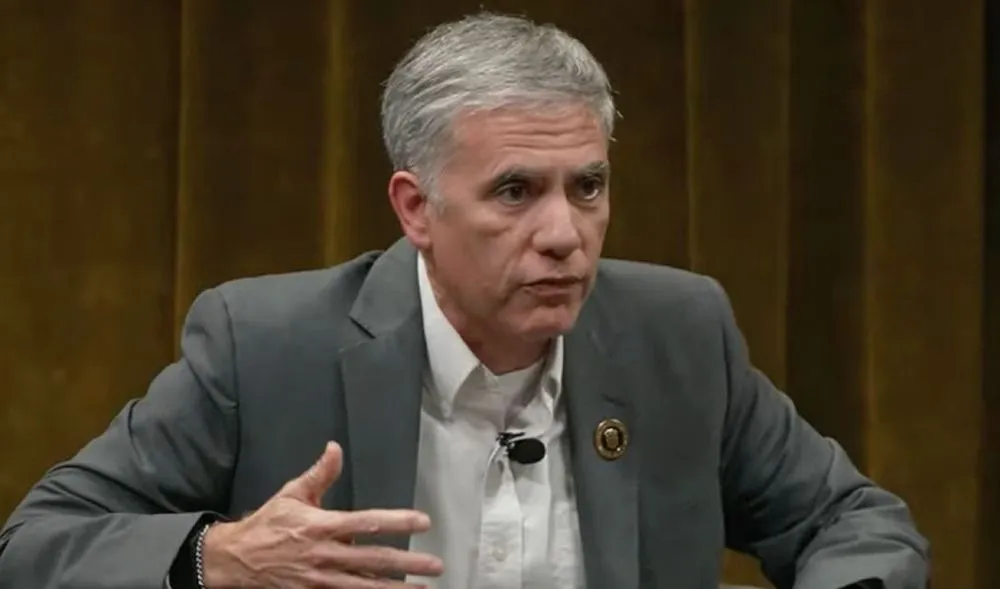Nakasone on Cyber Command, NSA firings and the future of the ‘dual-hat’ relationship
NASHVILLE — Former U.S. Cyber Command and NSA chief Paul Nakasone on Thursday said the dismissal of his successor and another top official would have a negative impact on national security.
“To the point of, does it cause disruption? Anytime you would take out a leader and the principal deputy, that's got to cause disruption,” Nakasone told reporters during a roundtable at Vanderbilt University’s Summit on Modern Conflict and Emerging Threats.
President Donald Trump last week fired Nakasone’s replacement, Air Force Gen. Timothy Haugh, and his NSA deputy, Wendy Noble. The moves continue to reverberate throughout the national security apparatus and on Capitol Hill, with many concerned they are just a prelude to bigger changes to both organizations.
Nakasone said he didn’t know “what really occurred” and has not spoken to either Haugh or Noble since the presidential decisions were made. He lauded both of them as “extraordinary leaders” who he had confidence in when they worked together.
“I'm concerned that the National Security Agency lost its number one, its number two, leaders. But I also say that I understand that, at the end of the day, that's the president's choice for who he wants to have in there.”
He also described Army Lt. Gen. William Hartman, who is leading both entities in an acting capacity, as “a guy at the top of his game” and qualified to take on the two roles.
“I will tell you: when I went from three stars to four stars, it's a huge jump. It's not just a small jump, it's a huge jump. And so is he qualified? Yes.”
Here are the highlights of the conversation with the retired four-star who is now the first director of Vanderbilt’s Institute of National Security:
Dual hat
In the wake of Haugh’s ouster, speculation has run rampant if Trump will sever the “dual hat” leadership structure at Cyber Command and NSA. Nakasone, a longtime defender of the arrangement, cited advanced policy questions from Lt. Gen. Dan Caine, Trump’s nominee to be America’s top military officer, that one person should have both roles.
“I thought that that was an interesting indicator of what's going on.”
Nakasone didn’t express concern that Defense Secretary Pete Hegseth and the Director of National Intelligence indicated in similar questions that a split might happen.
“This is not uncommon, where you have different fractions within the government saying one thing and the other one saying the other thing, particularly with the dual hat,” he said. “I come back to my experience with this is the fact that if you want to operate speed, if you want to operate with agility, if you want to operate with unity of effort, the dual has a way to go and I think it's the best thing for our nation.”
Chris Krebs
On Wednesday, Trump signed an executive order targeting Chris Krebs, the former head of the Cybersecurity and Infrastructure Security Agency (CISA), who worked alongside Nakasone to secure the 2020 election from foreign interference.
Nakasone said he had not read the order but had “high praise” for the work performed by the domestic cyber agency and the FBI to safeguard elections.
He also dismissed the idea he, too, might be targeted.
“I live in the world in which I live right now and that's not something I'm thinking about.”
Section 702
Nakasone urged the Trump administration to start its campaign to renew Section 702 of the Foreign Intelligence Surveillance Act, which is slated to expire next year, as soon as possible. The statute allows the federal government to collect the emails and electronic communications of foreign intelligence targets but also incidentally hoovers up the personal data of Americans.
“You can't start early enough. And I think we learned this during the last administration. We probably should have started earlier,” he told reporters.
“This was the most important authority that I used during my six years to be able to, first of all, understand our adversaries, but being able to react very, very agilely to what was going to occur whenever a situation came up,” according to Nakasone.
“The first thing that I would normally say is, ‘What is 702 telling us?’”
North Korea
The retired general said Americans should continue to consider North Korea as a top adversary in cyberspace.
He noted he was the head of the Cyber National Mission Force in 2014 when the notorious hacker group Lazarus crippled Sony Pictures
“That was kind of our first indication that they're very capable. And it's interesting that they have gone in a different manner in terms of, now it's revenue generation,” Nakason said.
“We haven't had a lot of success against them,” he added. “I mean, you continue to see not only the fact that they have been able to garner a tremendous amount of revenue over the past several years, but also the concerning piece that they're applying for jobs and different companies as well.”
That potential insider threat is the “piece that we've got to kind of think differently about.”
Martin Matishak
is the senior cybersecurity reporter for The Record. Prior to joining Recorded Future News in 2021, he spent more than five years at Politico, where he covered digital and national security developments across Capitol Hill, the Pentagon and the U.S. intelligence community. He previously was a reporter at The Hill, National Journal Group and Inside Washington Publishers.



